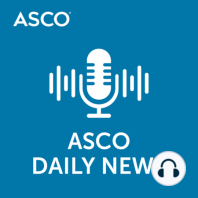25 min listen
ASCO23: CodeBreak-101, NAPOLI-3, and Other Advances in GI Cancers
FromASCO Daily News
ratings:
Length:
22 minutes
Released:
May 25, 2023
Format:
Podcast episode
Description
Dr. Shaalan Beg and Dr. Mohamed Salem discuss novel therapies in gastrointestinal cancers, including CAR T therapy and the CodeBreak-101 trial in mCRC, new advances in uHCC in the HIMALAYA trial, and an exciting update from the NAPOLI-3 trial in pancreatic cancer, ahead of the 2023 ASCO Annual Meeting. TRANSCRIPT Dr. Shaalan Beg: Hello, and welcome to the ASCO Daily News Podcast. I'm Dr. Shaalan Beg, your guest host of the podcast today. I'm the vice president of oncology at Science 37 and an adjunct associate professor at UT Southwestern Simmons Comprehensive Cancer Center. My guest today is Dr. Mohamed Salem, a GI oncologist at the Levine Cancer Institute at Atrium Health. We'll be discussing key posters and oral abstracts in GI oncology that will be featured at the 2023 ASCO Annual Meeting. Our full disclosures are available in the transcript of this episode, and disclosures of all guests on the podcast can be found in our transcripts at asco.org/DNpod. Mohamed, thanks for coming on the podcast today. Dr. Mohamed Salem: Thanks, Shaalan. Dr. Shaalan Beg: There's some interesting studies in colorectal cancer that I'd like to get us started with today. Abstract 3547 is titled “A Phase I Dose-escalation Study of GCC19 CAR T: A Novel Coupled CAR Therapy for Patients with Metastatic Colorectal Cancer.” What are your thoughts on the study? Dr. Mohamed Salem: Actually, this was a very exciting study to see coming out in GI cancer, especially colorectal cancer. As you know, CAR T made its way to the treatment of lymphoma and other heme malignancies. In fact, we saw a fascinating response and outcome using that technique and that niche in the immunotherapy module. The challenge we had was that we could not replicate this in solid tumors until very recently. I'm sure you had the same thing in your clinic, too. A lot of patients with GI cancer or colorectal cancer come to you and say, "Okay, why can't I have CAR T?" And the response was, "We don't know if it's effective or if it's going to work yet." Here at our center, we had a phase 1 study, I think that was looking also at CAR T and solid tumors, particularly prostate cancer. So that I think was very exciting to see that technology is making its way to the solid tumor. I was very pleased to see this CAR T study coming out from the work of our Chinese colleagues looking into this in the CRC space. Obviously, as you know, in colorectal cancer, we made a significant advancement, but I don't think we made enough advancement yet, and especially for refractory patients, patients with refractory disease who have underwent multiple lines of therapy. And this study actually addressed the need for those patients. So in this study, that was a phase I escalation dose, very much is we looked at about 13 patients who had metastatic CRC, they had at least two lines of therapy. So in what we say is a "refractory setting," unfortunately for those patients, we don't have large treatment options. And they used two doses, the first dose and the second dose that was a little bit higher. And the interesting part is that they were able to see very nice responses on this patient population. In the lower dose, I think the response was the PFS was about 1.9 months. But when they went up on the dose, actually the PFS was 6.3 months, which I think in the refractory setting is very meaningful. And also the median overall survival for the first group was 13 months, which in the refractory setting is something we don't see often, and the higher dose was 18 months, which was even better. So there was a trend that higher doses are perhaps more effective or have better efficacies than lower doses, but also in terms of side effects, actually patients were relatively able to tolerate it well, and there were no surprising adverse events. So again, yes, that's 13 patients in total. So it's a very small study, but like everything else, the proof of concept sometimes is the first step and it's very important to
Released:
May 25, 2023
Format:
Podcast episode
Titles in the series (100)
Dr. Derek Raghavan Has a Remedy to Mitigate Financial Toxicity in Cancer Treatment: Transcript: Dr. John Sweetenham: Hello, I'm John Sweetenham, Associate Director of Clinical Affairs at UT Southwestern's Harold C. Simmons Comprehensive Cancer Center, and the guest host of ASCO Daily News Podcast today. I'm joined by my friend and... by ASCO Daily News
